The Cervélo ZFS-5 was first spotted, properly at least, at the Nove Mesto round of the 2023 XC World Cup, with its frame decked out in Jumbo-Visma’s yellow and black colourway.
Cervélo isn’t a name frequently associated with flat bars, with the brand's name primarily plastered down the side of road bikes that have proved dominant in Grand Tours this year.
However, the ZFS-5 XX SL AXS is as serious a bike as those that roll down the Champs Élysées.
What was just as eye-catching as the yellow paintjob earlier this year, was the use of an alloy link in place of the shock during the short-track XCE race, turning the bike into a super-reactive hardtail. It was a sneaky, nifty and in my eyes brilliant bending of the UCI’s rules.
After a month of testing, I can confirm this is a bike destined for the race track, with unmistakably cross-country orientations in the 100mm version I rode.
Snappy acceleration, precise handling and low weight make this a bike suited to the most serious racers. However, does it work for those looking for all-round performance too?
2024 Headliners bike test
Our annual Headliners bike test is an opportunity to swing a leg over the new bikes we're most excited to ride, and a chance to delve deeper into the minds of the product managers and engineers with their fingers on the pulse of where the industry is heading.
This year, we've selected six new bikes for 2024 that epitomise the cutting edge of mountain biking in its various forms.
Bikes on test
Cervélo ZFS-5 XX SL AXS frame and suspension
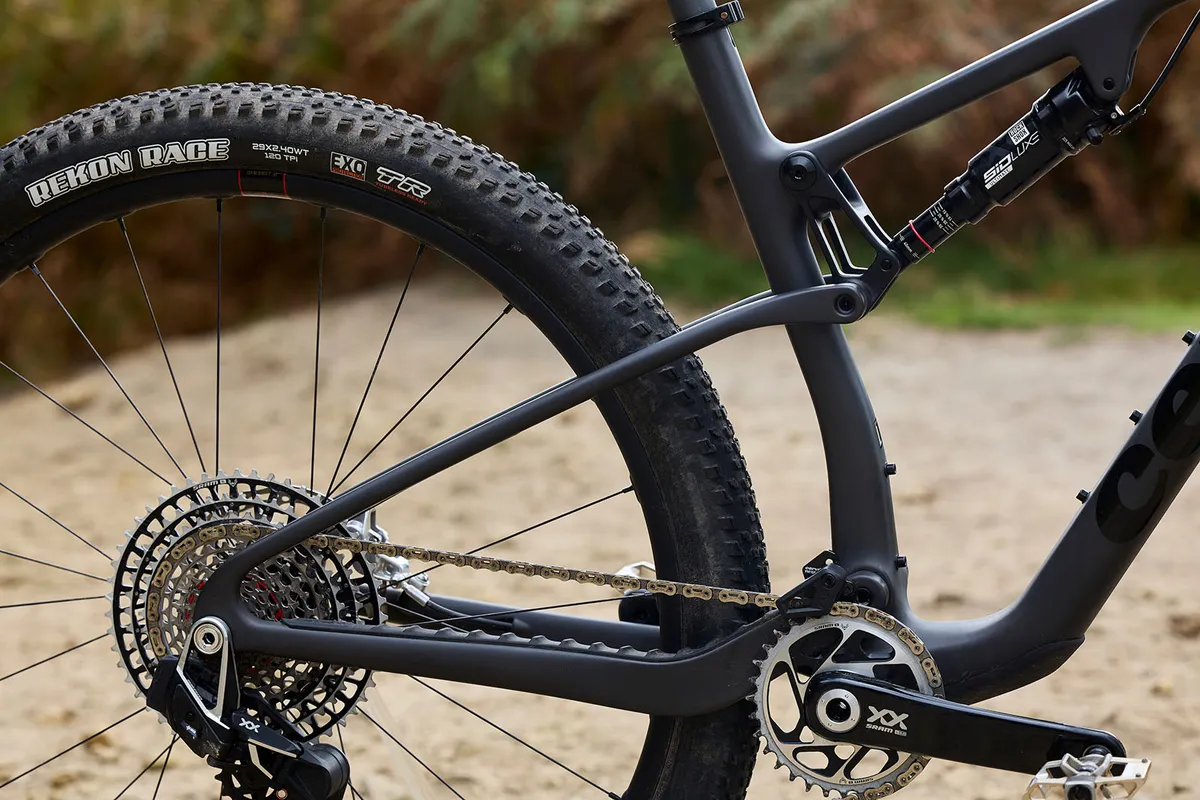
As is the norm for full-gas XC race bikes, Cervélo has built the ZFS-5 XX SL AXS from carbon, with both front and rear triangles made from the black stuff.
Cervélo employs a flex-stay rear-suspension design, in keeping with the bulk of XC and shorter-travel bikes these days. This means there’s no pivot on the chainstay or seatstay, saving weight and complexity.
The rear brake mount is semi-floating – there’s a forward anchor point on the chainstay, and the rear anchor point sits around the rear axle. This enables the chainstay/seatstay junction to flex better.
The seatstays push an alloy upper link that compresses a 40mm-stroke shock, sat just under the top tube.
While the version I tested gives 100mm of travel, a 45mm-stroke version exists, offering a more trail-friendly 115mm.
The shock’s lockout cable (this is a race bike after all, so it’s no surprise to see an on-bar lockout) pops out of the top tube just in front of the shock.
Cables are routed through the headset’s top cap and the top bearing. While it adds to maintenance schedules (in my experience), I feel this is an acceptable annoyance for the clean looks, light steering and potentially lighter frame it allows on such a bike.
Towards the back, cables exit just above the bottom bracket via a rubberised port, before travelling inside the chainstays to the rear brake or rear derailleur (if you’re not running a SRAM AXS groupset).
The frame doesn’t have masses of rock-strike protection, though there is a plate under the threaded BB and a little way along the bottom side of the down tube.
There’s space for a couple of water bottles inside the frame, along with 2.4in rubber at the back.
Cervélo ZFS-5 XX SL AXS geometry
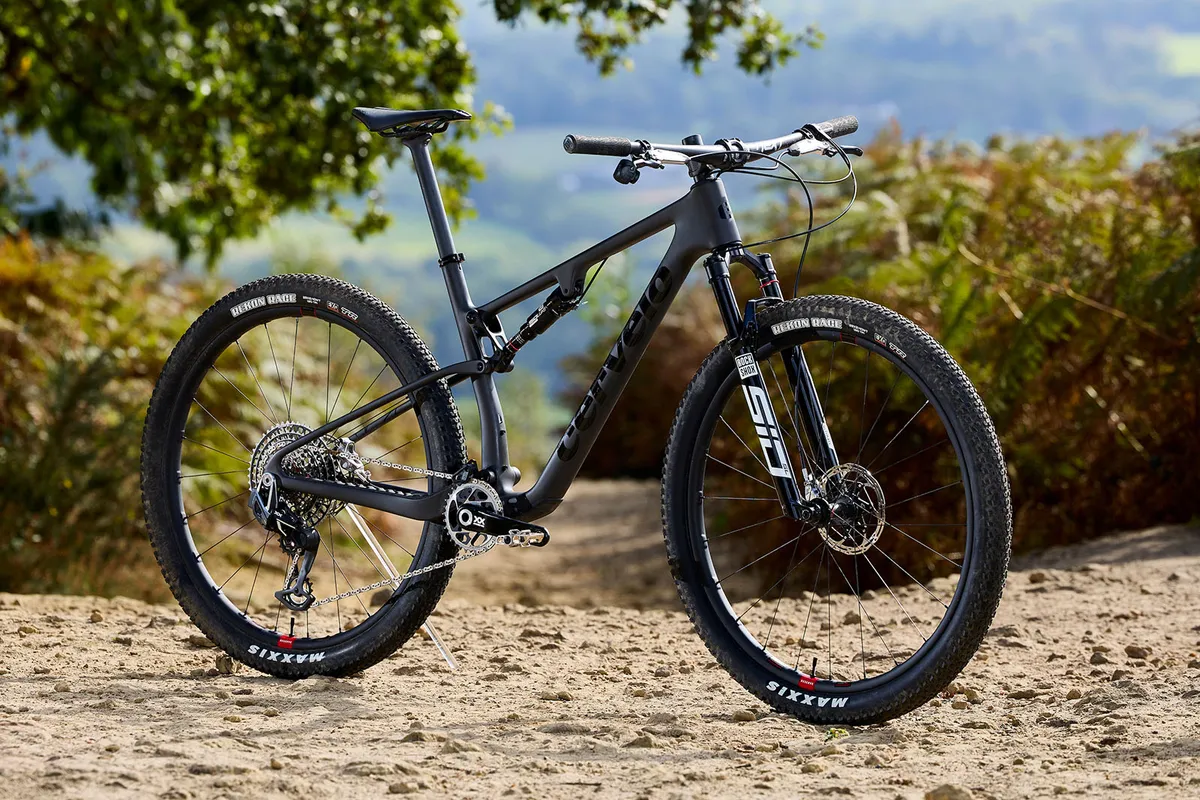
At 182cm tall, I tested the Large ZFS-5.
The numbers given to the bike by Cervélo are modern, though they don’t push boundaries.
As such, if you’re replacing an existing XC race bike, you’re likely to find this one a touch more modern than a bike from a few years ago, but it’s not going to feel radically different.
The head angle is listed at 67.8 degrees, which is at the ‘sportier’ end of the contemporary XC world, while the seat angle is 76.2 degrees – not slack, but not as steep as some.
On the trail, with the bike sitting high in its progressive travel, I didn’t find this an issue.
Reach is an easy method of comparing bikes, and this one’s figure of 469mm (Large) is fairly long.
Chainstay lengths grow across the four sizes, from 432mm to 440mm.
| | Small | Medium | Large | X-Large |
|---|---|---|---|---|
| Reach (mm) | 421 | 445 | 469 | 496 |
| Stack (mm) | 584 | 590 | 601 | 614 |
| Head tube angle (degrees) | 67.8 | 67.8 | 67.8 | 67.8 |
| Front center (mm) | 692 | 718 | 746 | 779 |
| Bottom bracket drop (mm) | 42 | 42 | 42 | 42 |
| Head tube length (mm) | 96 | 102 | 114 | 128 |
| Top tube length (mm) | 561.6 | 589.1 | 617.3 | 649.1 |
| Seat tube angle (degrees) | 76.5 | 76.3 | 76.2 | 760 |
| Standover height (mm) | 746 | 744 | 744 | 744 |
| Wheel Size (in) | 29 | 29 | 29 | 29 |
| Fork offset (mm) | 44 | 44 | 44 | 44 |
| Wheelbase (mm) | 1,120 | 1,149 | 1,180 | 1,215 |
| Chainstay length (mm) | 432 | 435 | 437 | 440 |
Cervélo ZFS-5 XX SL AXS specifications
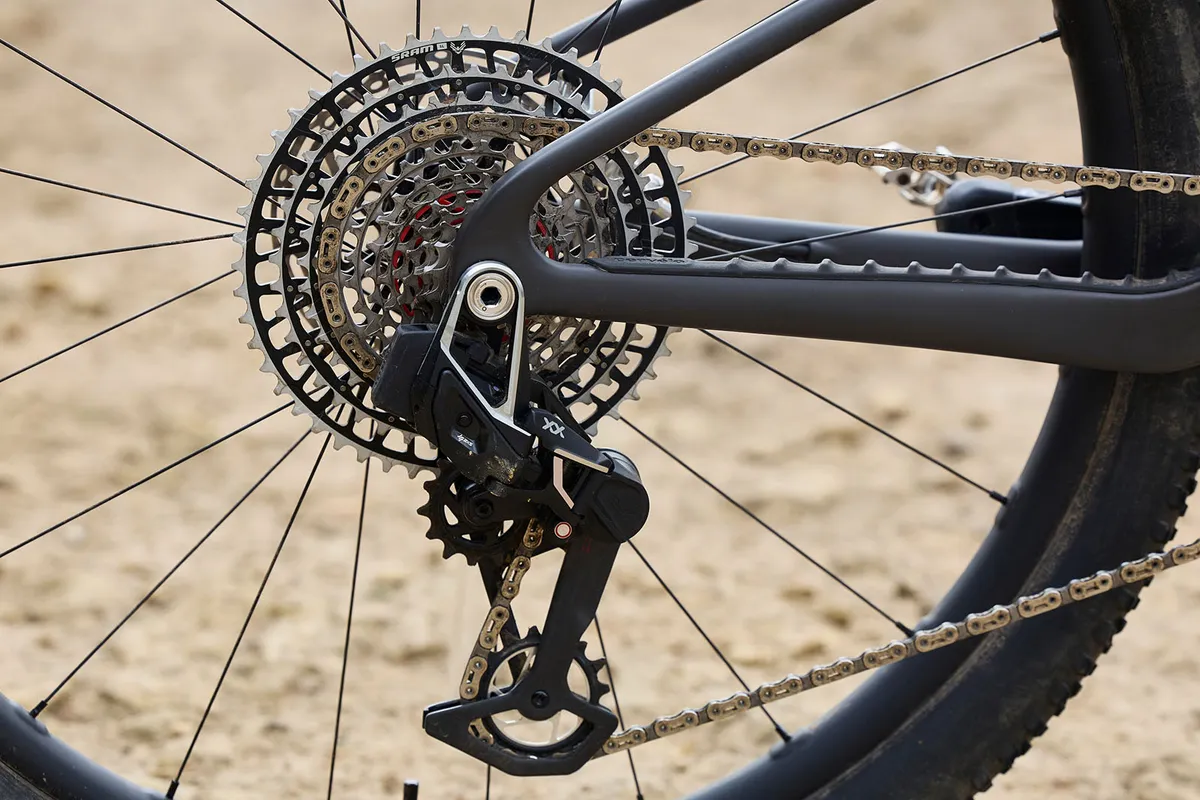
Much like its extended-family brand Santa Cruz (they’re both owned by PON), Cervelo’s naming convention hints at the spec level.
The bike is driven by SRAM’s lightweight XX SL AXS transmission, with a 32t chainset lacking a power meter (aftermarket XX SL transmissions tend to come with a 34t chainset with integrated power meter).
This is joined by Level Ultimate brakes, with four pistons for plenty of stopping power.
SRAM also supplies the suspension, via its RockShox brand. There’s a 100mm SID SL Ultimate fork and a SIDLuxe shock, both of which go very firm with a twist of the on-bar lockout twist grip.
The Reserve 28 XC wheels have 28mm internal-width carbon rims, built around mid-range DT Swiss 240 hubs. My favourite 120 TPI Maxxis Rekon Race tyres are fitted in a 29x2.4in width.
Finishing kit includes a rigid post and 35mm-diameter bar from Race Face.
Cervélo ZFS-5 XX SL AXS ride impressions
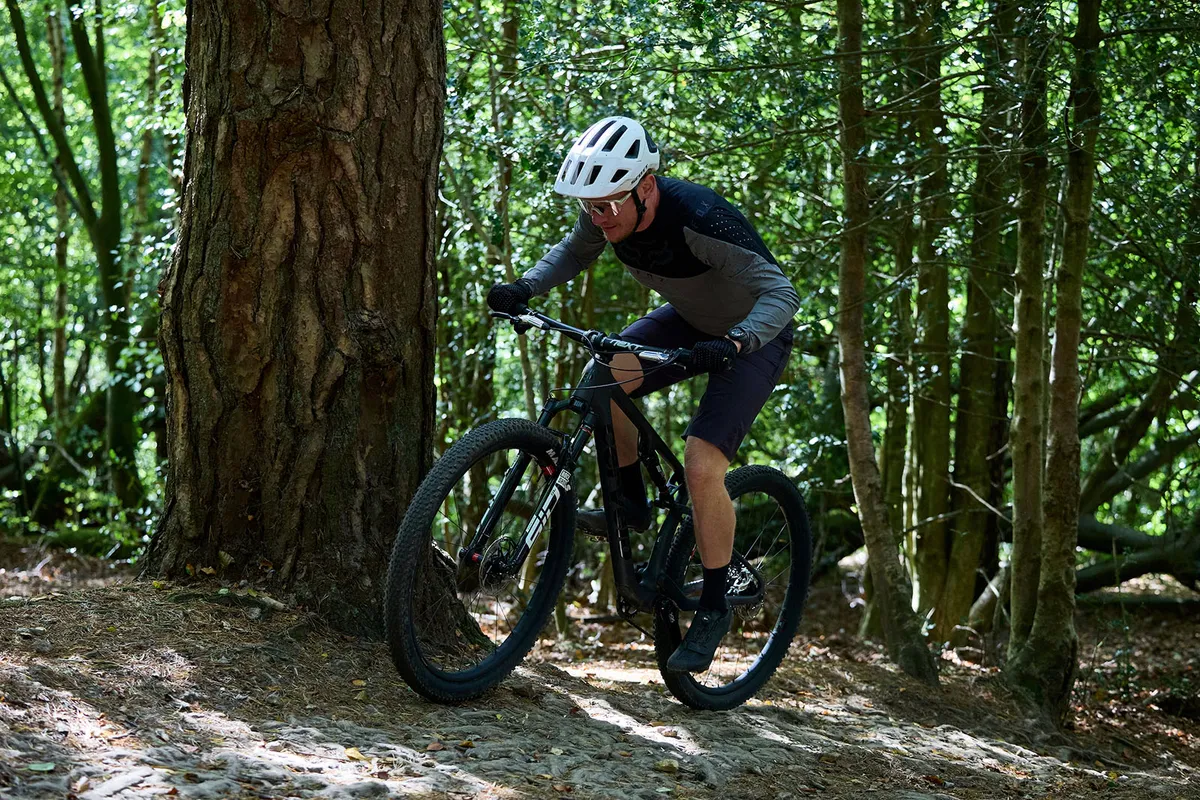
The bike was tested on my usual XC test loops, which take in plenty of short sprinted blasts, through to rockier tracks and trails in Wales.
In addition, the ZFS-5 accompanied me on a number of longer marathon-style rides in the countryside.
Setting the bike up was relatively easy. With the fork and shock damper settings largely controlled by the on-bar lockout, there was minimal work needed there, other than to tune air pressures and rebound settings.
Mid-way through testing, I pulled the shock apart to work out the air-spring volume situation, but this was as far as my setup and maintenance process needed to go.
I ran the tyres with around 20psi in the front and 22psi at the rear, though this varied a touch with conditions.
I ran the fork at the upper end of the air pressure bracket for my weight, and varied the shock’s sag between an aggressive 20 per cent and more forgiving 28 per cent.
Cervélo ZFS-5 XX SL AXS climbing performance
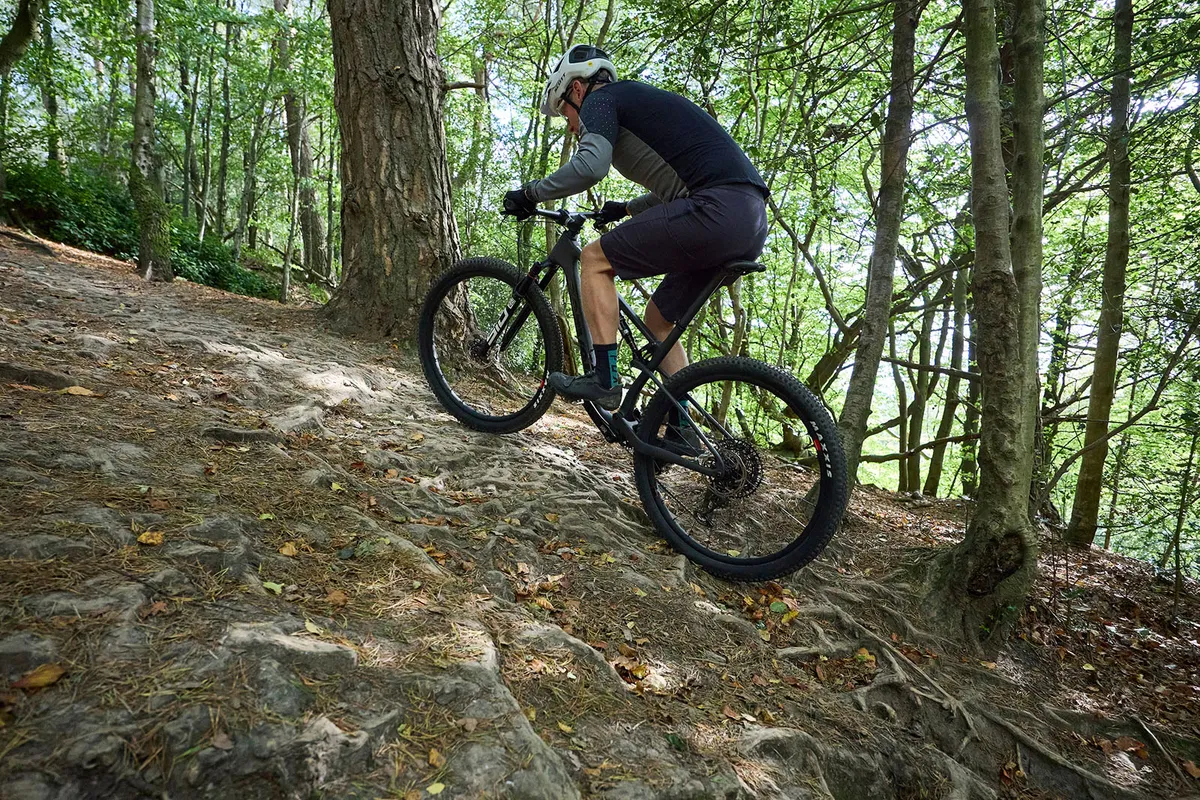
The Cervélo ZFS-5 is a very accomplished climber.
With the on-bar lockout easy to actuate, tarmac drags disappear with ease. The tyres roll fast on smooth ground, while the suspension is turned effectively rigid.
As such, the only meaningful place where effort can be lost is in your body position in the wind.
With a backside-up, head-down attitude, a moderately roomy front triangle and the new stealth levers from SRAM giving a firm handhold narrower on the bar, it’s easy to get into as aero a tuck as you can reasonably expect from a mountain bike.
Once the trail has transitioned from tarmac to hardpack, the supple rubber gives grip and compliance. This ensures the lockout can stay firm for as long as your hands can hold on and your pedal stroke can stay smooth.
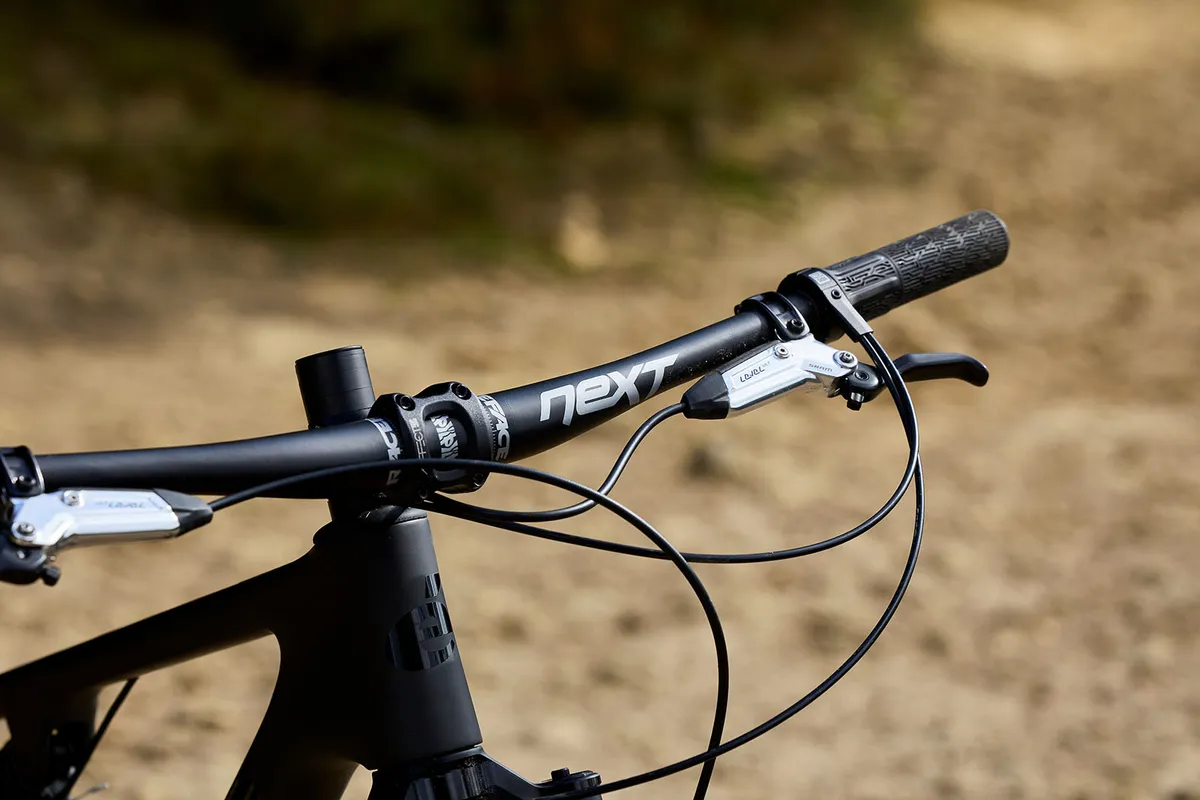
While it should be expected from an XC race machine, even with the suspension open, the ZFS-5 has an aggressive attitude to maintaining pace.
There’s minimal pedal bob when you’re sat, and not a huge amount when you stand on the pedals.
Even so, over knobbly terrain, the suspension enables the wheel to track the ground effectively, so there’s not too much interference with your pedal stroke, and the tyres are well placed to make the most of their meagre tread.
While some XC bikes lead to dirt being spat out the back of the bike over typically loose UK trail-centre climbs, the ZFS-5 seemed to cope better. There was ample traction in nearly every situation.
Making moves
On crux moves, the bike’s stability comes into play too. With the rear wheel cresting a step and a push at the pedals, the bike doesn’t sink into its suspension and then spit out power to the back wheel on rebound.
Instead, the tyre grips and the bike seems to float up and over without complaint, the shock staying suitably still.
On the hardest sprints, the front triangle is stiff, with the bar-to-pedal feel reassuringly accurate. However, it’s also noticeable that the rear triangle doesn’t quite have as much stiffness as the front half.
There’s a slight softening of your effort – not enough to hamper speed, and in some instances to aid grip when you’re off-camber, but there feels a marginal disconnect from bar to back wheel.
Equipment check
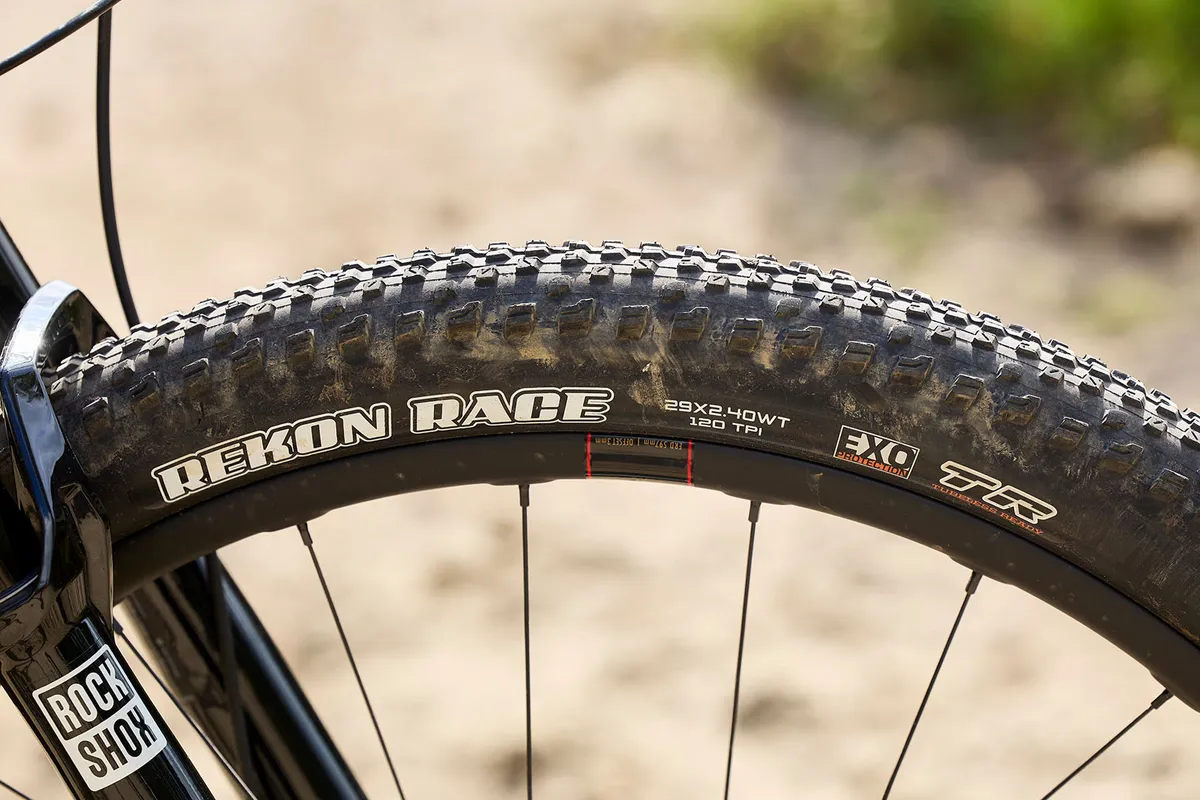
In terms of kit, aside from the excellent tyres, it’s on climbs where SRAM’s shifting is most noticeable.
The shift quality is second to none, staying accurate up and down the block regardless of how much effort you’re able to put through the cranks – it’s as unfazed by power input as any drivetrain I’ve tested.
However, in a race situation, the shift delay between clicking the shifter and the derailleur moving the chain can be frustrating.
Shift timing is determined by the chain’s position on the cassette, rather than the moment you push the button, and so, especially when you’re in the lower gears, you can get a quarter to a third of a crank revolution before the gear shifts.
Shift multiple gears, and this delay becomes even more prominent.
Faced against a competitor on XTR, and in those moments when you need to quickly shift and get the power down, the other racer might have gained a crank or two’s distance on you before your drivetrain settles down.
Cervélo ZFS-5 XX SL AXS descending performance
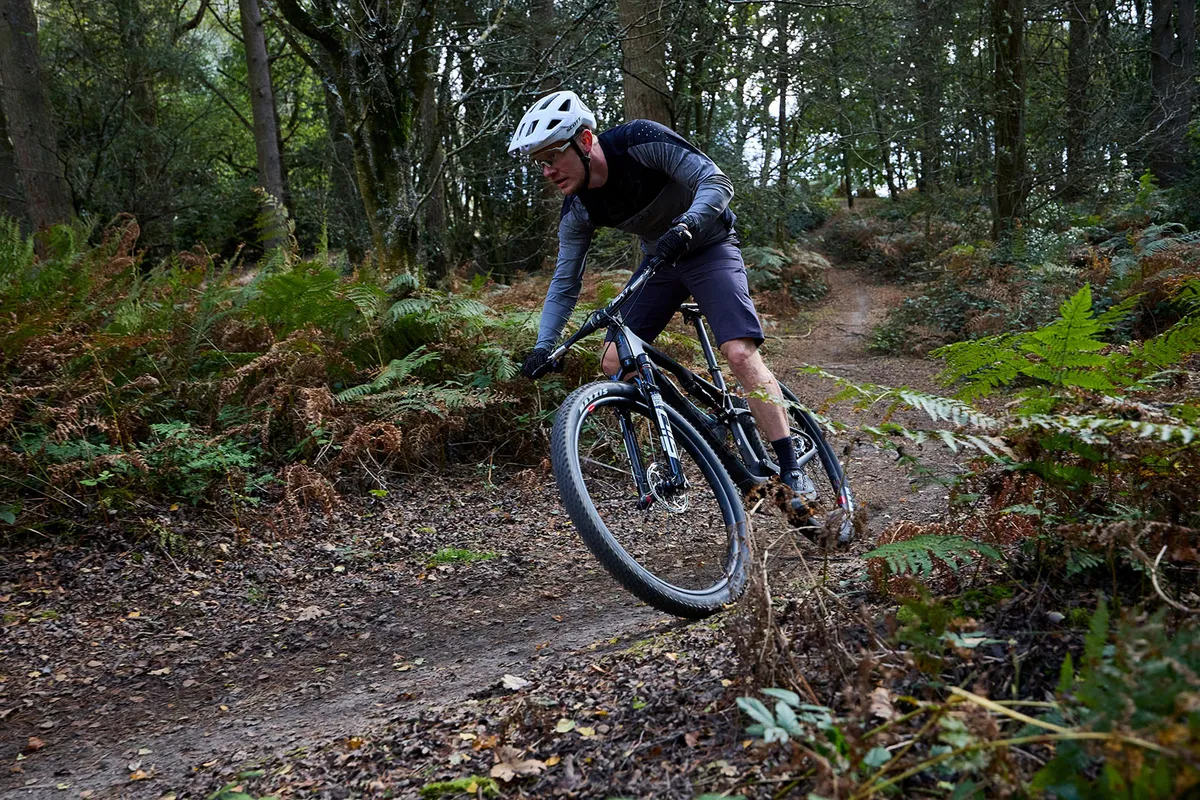
The geometry of the bike is pretty middle-of-the-road for a 2023 XC race bike.
The head angle is effectively 68 degrees, which isn’t slack, and while the 469mm reach (Large) is on par with many of its competitors, it’s not groundbreaking.
This may sound like a negative, but the reality is these numbers are common because they work well.
Jump on the ZFS-5 from any other XC bike and you should feel at home.
The head angle certainly gives the bike turn-on-a-dime precision in tighter situations, and the reach figure means the front half of the bike gives stability when you’re hammering along.
With the cranks 42mm below the axles, you can weight the outside cranks and rely on the tyre’s minimal but effective shoulder tread to dig in and help you carve.
Fully suspended
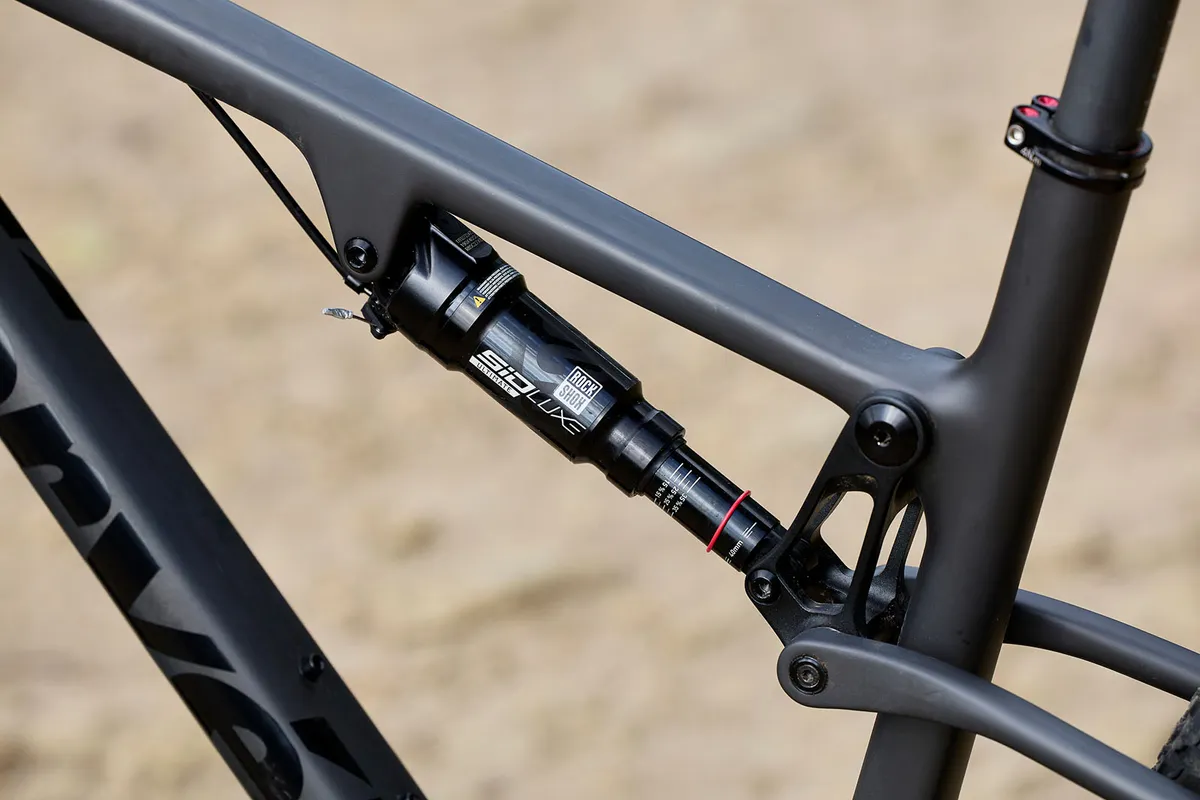
Much like climbing, the rear suspension dominates the feel of the bike on descents.
The firmness that gives the bike such capable climbing prowess doesn’t lead to harshness in the early stroke. Over small chatter, the bike is relatively smooth, enabling you to hold speed, and if the situation is right, keep the cranks churning out the power.
When you start to encounter mid-sized hits, you realise just how progressive the bike is.
The ZFS-5 sits higher in its travel than most, with a lot of mid-stroke support. This helps when you’re on smooth terrain and want to pump through berms and rollers, or send it off jumps – you can really push into the cranks and generate speed off the back of that.
However, when things get rough, you don’t quite have the same level of composure as some bikes give.
This is exacerbated by the fork, and this is no shade on the SID SL – it’s excellent.
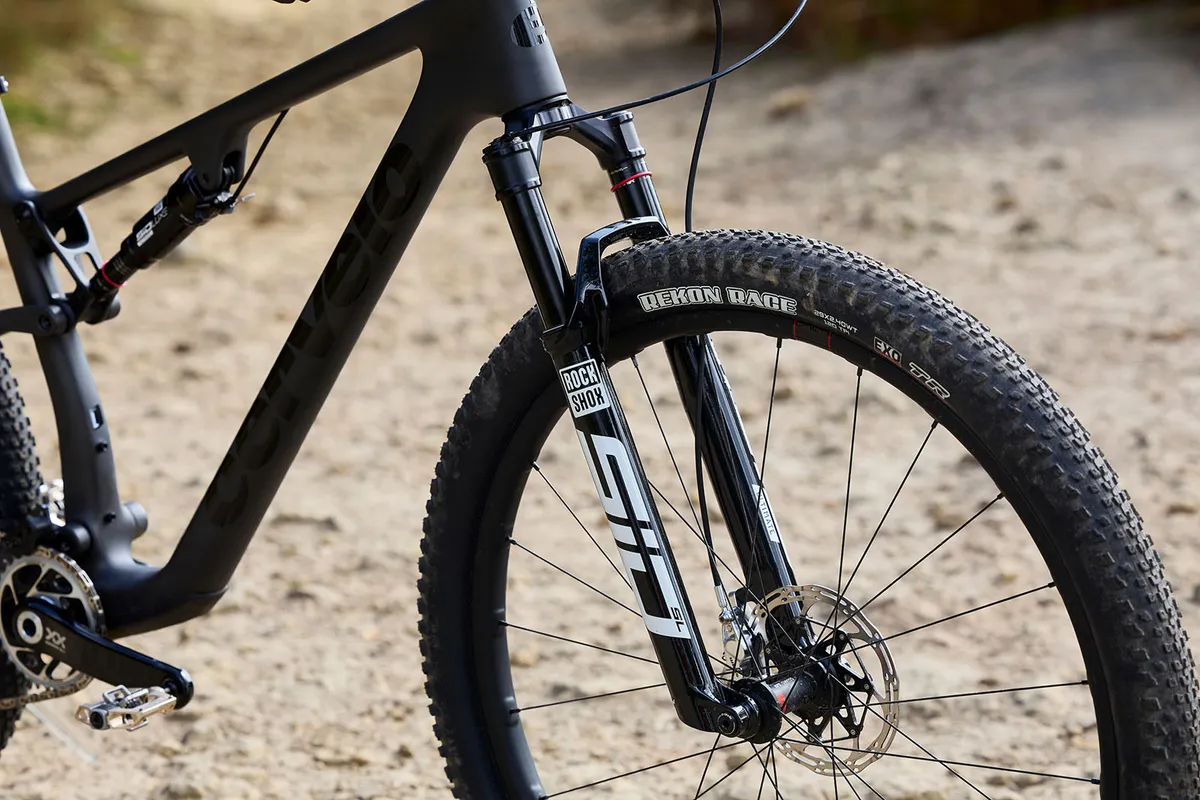
However, the fork provides its travel when the frame doesn’t, and so on the gnarliest bits of track there’s a fore-aft mismatch, in my experience.
This, at times, pitched the bike forward, steepening the head angle further.
To compensate for this, I tended to run the shock with up to 28 per cent sag, and with around 10psi more in the fork than recommended, just to balance them out. With more time on the bike, I’d definitely add spacers to the fork.
Doing so gave me more frequent access to the latter part of the frame’s travel (though never all of it) and kept the front end propped up a bit more.
Short-changed
I never did get the full 100mm out of the frame.
The shock’s 40mm stroke length is marked on the shock stanchion (and measures accurately with my tape measure). I never managed to get the full 40mm out of it either – more like 34 to 35mm, which equates to around 86mm travel in total.
I emptied the shock of air to check, and even with nominal amounts of air in it, I could never get it to bottom out, even with no volume spacers.
This is likely thanks to the combined efforts of a progressive linkage and a small-volume air shock.
Spec selection
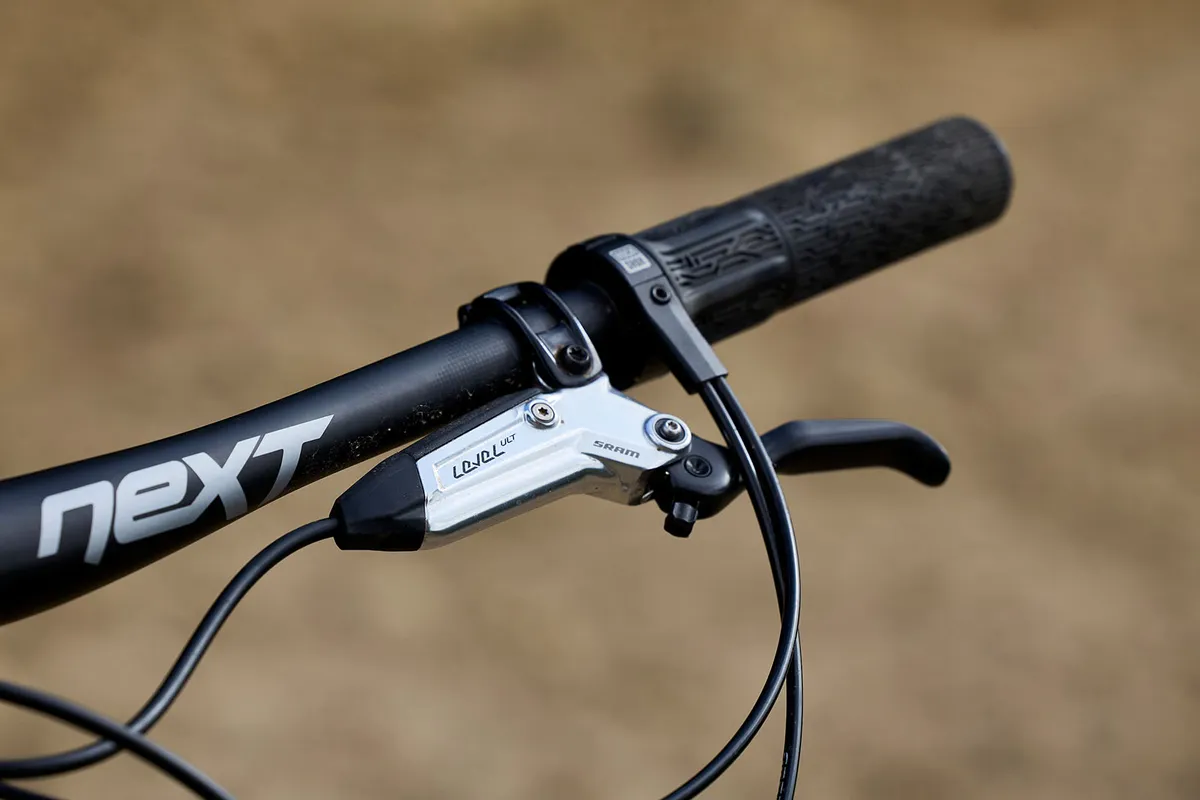
Kit-wise, I was largely very happy.
The tyres are, as I’ve mentioned, excellent, with their supple carcass and grippy rubber bolstering grip and comfort further than the skinny tread would suggest.
When it comes to the wheels, I’d like a quicker pick-up than the DT Swiss 270s offer here.
SRAM’s Level Ultimate Stealth brakes, with their four pistons, are sterling stoppers on an XC race rig.
The inclusion of a rigid post is anoter interesting talking point in 2023.
My experience is that XC hardtails often come with rigid posts, because these are the bikes pros, at least, are going to select on smoother, less technical courses, where saving grams trumps the ability to drop your saddle.
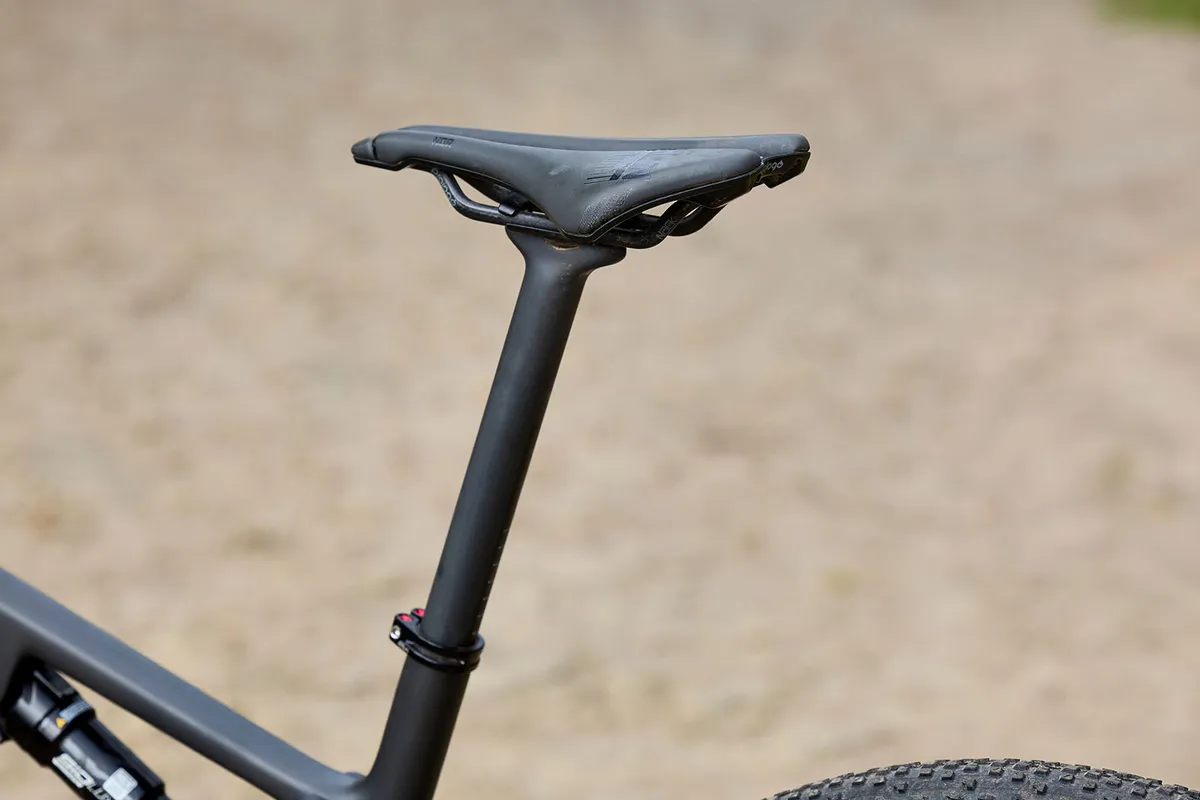
Full-suspension bikes often come with dropper posts these days. If the course demands a (heavier) full-suspension frame to speedily negotiate it, an extra couple of hundred grams on a dropper is usually seen to be a worthwhile investment for the descents.
Regardless, a dropper of your choice could be fitted, or you can do your best John Wayne impression as you descend.
Finally, my experience of Race Face 35mm-diameter bars is they’re pretty harsh, and with a narrower width on these XC-focused flat bars, there was a notable amount of harshness to contend with. On longer, marathon-style rides, I was wishing for a more compliant bar.
How does the Cervélo ZFS-5 compare to the Orbea Oiz?
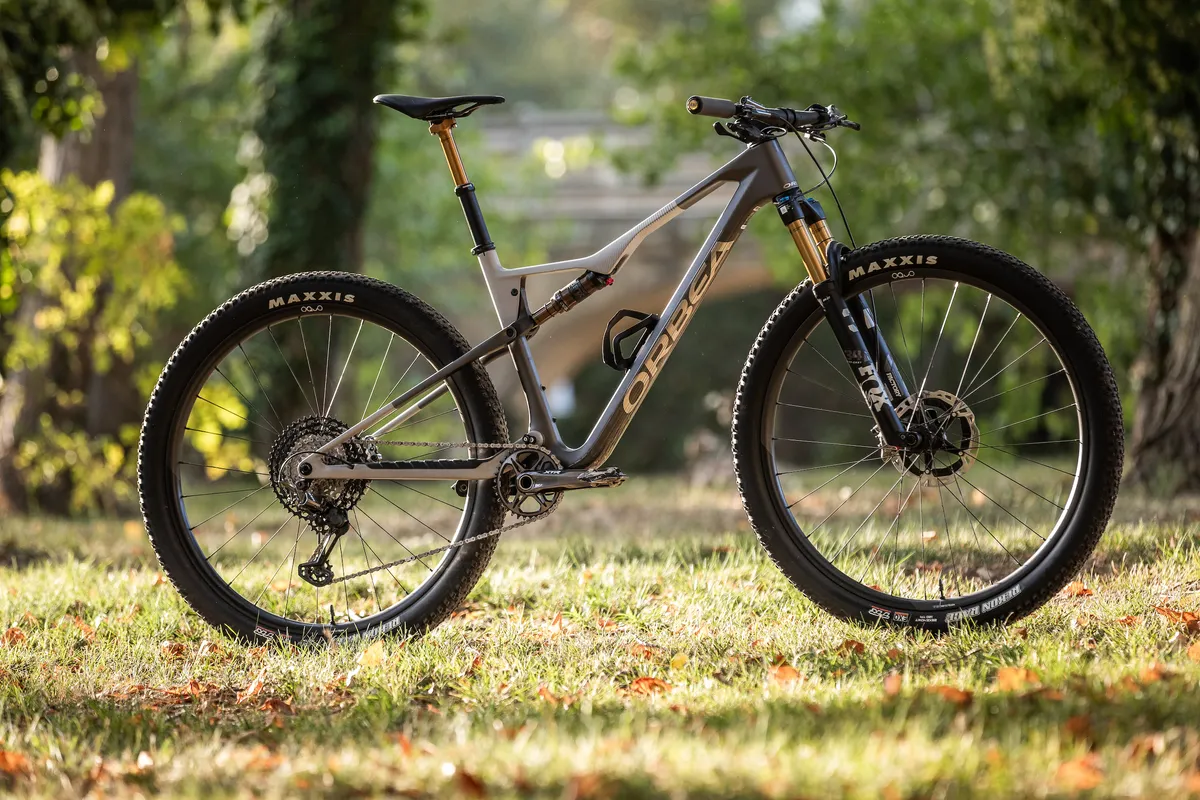
Both of these bikes are relatively fresh to the market. The Orbea Oiz sports 120mm of travel at each end, and along with a factory-fitted dropper, is an absolute hoot on the descents.
The Cervélo feels much more focused – you need to have all your attention on the task ahead to make it down the trail at speed.
On the climbs, it’s no contest – the Cervelo trumps the Orbea, with a firm, incredibly efficient suspension platform and aggressive attitude.
The Oiz still climbs well, with the three-position SquidLock level offering changes in feel, but I like the no-nonsense approach of the ZFS-5 a touch more.
Cervélo ZFS-5 XX SL AXS bottom line
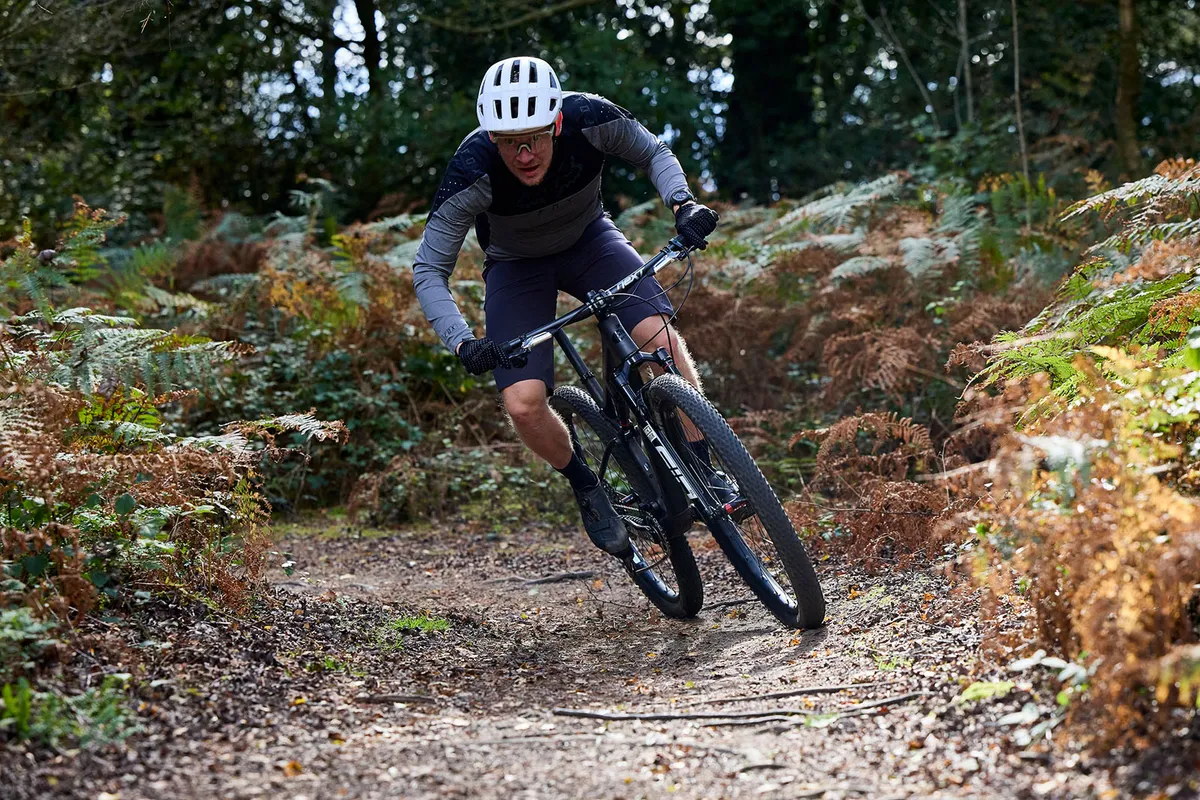
The ZFS-5 is a no-nonsense XC race machine, hyper-focused on going as fast as possible.
The suspension and shape reward those who want to put in their absolute maximum effort all the time.
However, the progressivity of the suspension robs you of a little descending capability, which in turn makes this very much a Sunday-best race-bike only, in my opinion.
Product
| Brand | Cervelo |
| Price | €11299.00, £10499.00, $10700.00 |
| Weight | 10.24kg |
Features
| Fork | RockShox SID SL Ultimate, 100mm travel |
| Stem | RaceFace Aeffect Alloy |
| Chain | SRAM XX SL |
| Frame | Carbon fibre, 100 travel |
| Tyres | Maxxis Rekon Race EXO TR 29x2.4in f, Maxxis Rekon Race EXO TR 29x2.4in |
| Brakes | SRAM Level Stealth Ultimate, 160/160mm rotors |
| Cranks | SRAM XX SL 32t |
| Saddle | Prologo Dimension |
| Wheels | Reserve 28 XC |
| Headset | FAS IS2 |
| Shifter | SRAM Pod AXS |
| Cassette | SRAM XX SL |
| Seatpost | Cervelo SP29 |
| Grips/tape | SRAM |
| Handlebar | RaceFace Next Carbon 35mm, 760mm |
| Rear shock | RockShox SIDLuxe Ultimate |
| Bottom bracket | SRAM DUB |
| Available sizes | S, M, L, XL |
| Rear derailleur | SRAM XX SL |
